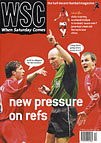 Finally, China have made it to the World Cup finals. They can hardly wait and nor can the Korean tourism industry. Zhang Wenya reports
Finally, China have made it to the World Cup finals. They can hardly wait and nor can the Korean tourism industry. Zhang Wenya reports
If England fans think “30 years of hurt” was tough, pity their Chinese counterparts. China have been trying simply to qualify for the World Cup finals since 1957. Nearly 50 years of hurt – and considerable heaps of humiliation – have been the fate of fans in the world’s most populous country. Among a people for whom “face” (and not losing it) is of considerable importance, the procession of defeats in vital qualifying matches has been soul-destroying.
While tiny countries like Costa Rica qualified, with populations you could fit into a couple of districts of one Chinese city, China, with its 1.3 billion people, could only watch from a distance. Even worse, near neighbours South Korea qualified for the World Cup four times in a row (to add to the North’s appearance in 1966) and in the 1990s Japan began to succeed too. With the Korea/Japan World Cup in prospect, it would have been simply unbearable to watch the party taking place next door and not be able to get in.
In their desperation to qualify, the Chinese FA found itself scouring the world for foreign coaches. The current national coach, Bora Milutinovic, succeeded Bob Houghton – once of Bristol City and Malmo – who was sacked after China’s failure to qualify for the Sydney Olympics. The appointment of Bora (as he is known all over China) has succeeded where all others failed. At the seventh attempt (they did not take part between 1962 and 1978) China are through, and millions of people took to the streets to celebrate after the crucial victory over Oman.
The kind of attention Bora attracts from the Chinese media has to be seen to be believed. If Kevin Keegan thought it was tough in the UK, he wouldn’t have survived five minutes in the job in China. From the beginning of the qualifiers, more than 600 journalists followed the national team’s home matches. Even abroad, there were over 100 reporters on the case. Rumour has it desperate measures were adopted by some to get close to an increasingly nervous and harassed national coach.
The nation gossiped endlessly about one female journalist, Li Xiang, who spoke two languages Bora understood – Spanish and English – and how she effortlessly managed to get “exclusive” access to him. Li Xiang became a pawn in the wars between various sports newspapers, but a well-paid pawn. One of her paper’s rivals, Sports Weekly, tempted her away from Soccer, with a three-month deal worth anything from 1.5 million to 3 million yuan (£250,000), depending on whom you believe. And Miss Li was hardly a football expert by all accounts. Soccer immediately began looking around for good-looking young women who spoke Spanish to take her place.
China played all their home matches in the northern city of Shenyang and rich Chinese fans flocked to the games, paying up to 6,000 yuan (£500) on the black market for tickets (in a country where average monthly wages are around 1,000 yuan). Shenyang’s politicians reckon the city took a billion yuan from the influx of football fans during the qualifiers, which gives you an idea of the impact China’s presence will have at the finals next year.
In China, the sheer numbers involved in almost any popular activity are always staggering. The compounded global TV viewing figure for France 98 was over 37 billion. Of those, more than seven billion were in China. Many of the matches kicked off at 3am local time and of course the Chinese team wasn’t even playing. Hundreds of millions watched China’s home qualifying matches on TV this time around and over 70 million saw the midnight kick-off in the crucial away match in Qatar. Given that the finals matches will kick off in prime time next year, the figures are going to be gigantic. There could be more than half a million travelling Chinese fans and perhaps as many as half a billion people turning on the TV back home.
No wonder Korea are trying to make sure China play there in the first stage (they’re unlikely to reach the second) to ensure the sagging Korean economy benefits from this expected invasion. Chinese fans began saving their money as soon as qualification was assured. The Koreans will be only too glad to relieve them of it.
The impact of qualification on Chinese football will be almost immediate. The CFA will rescind its current ban on the export of Chinese players under 28. In fact, top players will be positively encouraged to gain experience in Europe. And there are quite a few clubs interested too. Apart from those Chinese already in Europe – Yang Chen at Frankfurt, Fan Zhiyi at Crystal Palace and now Dundee – others have been approached. Lazio want defender Li Weifeng, Southampton have shown interest in goalkeeper Jiang Jin and Li Tie was recently linked with a move to Ajax. One of the attractions of signing these players is the potential marketing opportunities in China they will bring.
Qualification will also boost Chinese business involvement with football. Confidence had been waning, but now investment in clubs will grow. The CFA took extraordinary measures to assist the national team, even suspending the league for the duration of the qualifying matches without a word of complaint. Now they will reap the rewards. After Beijing’s successful bid for the 2008 Olympics, stand by for the big push to stage the World Cup in China.
From WSC 178 December 2001. What was happening this month